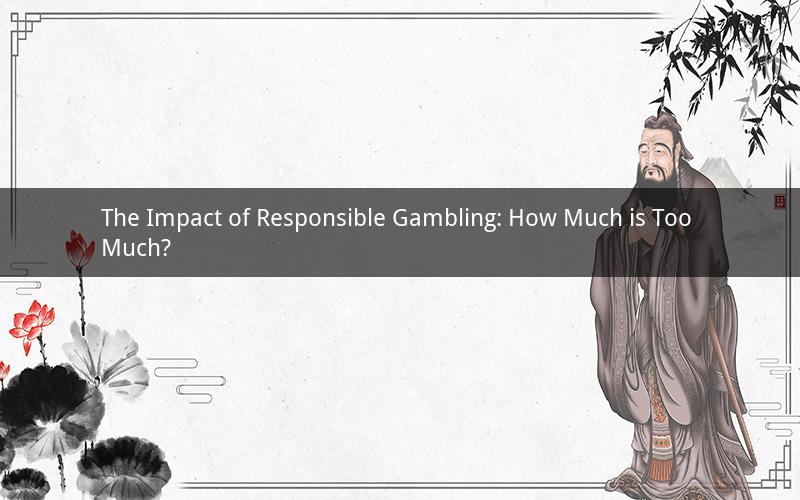
In recent years, the world has witnessed a significant surge in the popularity of gambling. With the advent of online platforms and the proliferation of casinos, more and more people are indulging in this risky activity. However, the question of how much gambling is responsible has sparked a heated debate among experts, policymakers, and the general public. This article aims to delve into the topic, exploring the potential risks associated with excessive gambling and the importance of responsible behavior.
1. What is responsible gambling?
Responsible gambling refers to the concept of enjoying gambling activities in a controlled and disciplined manner. It involves setting limits on the amount of money and time spent on gambling, as well as being aware of the risks involved. Responsible gamblers are those who can manage their gambling behavior without causing harm to themselves or others.
2. The risks of excessive gambling
Excessive gambling can lead to various negative consequences, both for the individual and society. Some of the most common risks include:
a. Financial problems: Excessive gambling can result in significant financial losses, leading to debt, bankruptcy, and even homelessness.
b. Mental health issues: Problem gambling can trigger or worsen mental health conditions such as depression, anxiety, and substance abuse.
c. Relationship problems: Excessive gambling can strain relationships with family, friends, and colleagues, as it may lead to neglect and emotional turmoil.
d. Legal problems: Gamblers who cannot control their impulses may engage in illegal activities to finance their gambling habits, such as theft or fraud.
3. How much gambling is too much?
Determining the exact threshold for responsible gambling is challenging, as it varies from person to person. However, some general guidelines can help identify when a person may be gambling excessively:
a. Financial strain: If gambling is causing financial difficulties, such as missing payments or accumulating debt, it may be time to reconsider the amount of money spent on gambling.
b. Time commitment: Spending an excessive amount of time on gambling, to the detriment of other responsibilities and interests, may indicate a problem.
c. Emotional and psychological effects: If gambling is causing stress, anxiety, or other negative emotional or psychological effects, it is essential to seek help.
4. The importance of responsible gambling education
Education plays a crucial role in promoting responsible gambling behavior. By providing individuals with information about the risks and consequences of excessive gambling, they can make more informed decisions. Some key aspects of responsible gambling education include:
a. Understanding the odds: Educating individuals about the odds of winning in different types of gambling can help them make realistic expectations and avoid disappointment.
b. Identifying warning signs: Teaching people to recognize the signs of problem gambling can help them seek help before the situation worsens.
c. Promoting self-regulation: Encouraging individuals to set limits on their gambling behavior can help prevent excessive gambling.
5. The role of governments and organizations in promoting responsible gambling
Governments and organizations play a vital role in promoting responsible gambling by implementing policies and initiatives aimed at preventing problem gambling. Some of the key strategies include:
a. Regulations: Implementing strict regulations on gambling activities, such as age restrictions, maximum bet limits, and advertising restrictions, can help mitigate the risks associated with excessive gambling.
b. Support services: Providing access to counseling and support services for individuals struggling with problem gambling can help them overcome their addiction.
c. Public awareness campaigns: Raising public awareness about the risks of excessive gambling can encourage responsible behavior and prompt individuals to seek help when needed.
In conclusion, the question of how much gambling is responsible is a complex one, as it depends on various factors, including individual circumstances and the specific type of gambling. However, it is crucial to recognize the potential risks associated with excessive gambling and to promote responsible behavior through education, regulations, and support services. By doing so, we can ensure that gambling remains a fun and entertaining activity for everyone involved.
Questions:
1. What are some common signs that a person may be developing a gambling problem?
Answer: Common signs include hiding gambling activities, borrowing money to finance gambling, feeling restless or irritable when not gambling, and prioritizing gambling over other responsibilities.
2. How can individuals set limits on their gambling behavior?
Answer: Individuals can set limits by establishing a budget for gambling, setting time limits for playing, and using self-exclusion programs offered by casinos and online platforms.
3. What are some effective strategies for preventing problem gambling among young people?
Answer: Effective strategies include educating young people about the risks of gambling, promoting healthy coping mechanisms for stress, and providing support for those who may be at risk.
4. How can governments and organizations collaborate to address the issue of problem gambling?
Answer: Governments and organizations can collaborate by sharing resources, implementing joint initiatives, and conducting research to better understand the causes and consequences of problem gambling.
5. What are some resources available for individuals struggling with problem gambling?
Answer: Resources include counseling services, support groups, helplines, and online resources that offer guidance, support, and treatment options for individuals struggling with problem gambling.